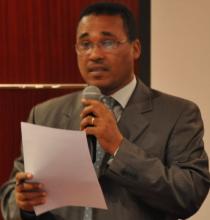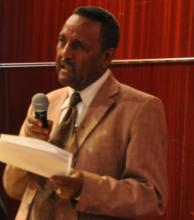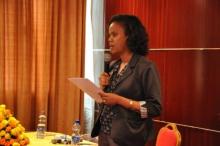13th African Traditional Medicine Day commemorated in Ethiopia
The 13th Africa Traditional Medicine Day was commemorated under the theme “Regulation of Traditional Health Practitioners in African Region” in August 31, 2015 in a workshop organized by WHO and the Food, Medicine and Health Care Administration and Control Authority. On this occasion, Ms Heran Gerba, Deputy Director General of Food Medicine and Healthcare Administration and Control Authority (FMHACA) while delivering an opening remark highlighted the valuable contribution of the traditional medicine in Ethiopia where 80% of the people use the traditional medicine. She also added that Ethiopia has been commemorating the TMD since 2001 to renew the government’s commitment in supporting the development of the sector for improving the traditional medicine service as well as ensuring its appropriate regulation.
Mr. Estifanos HaileGiorgis who also made a speech representing the traditional medicine practitioners, expressed his views in using the Ethiopian traditional medicine to help patients in-country and abroad and requested continued support from government and other concerned bodies. He asserted the need for a legal protection of traditional medicine practitioners, access and opportunity for international market as well as improvement of capacity to practice traditional medicine as per the WHO’s guidance.
On the other hand, Mr Abraham Gebregiorgis, Essential Drugs and Medicines Program Officer at WHO Country Office delivered the message of Dr. Matshidiso Moeti, Director, WHO Regional office for Africa which stated that “Traditional health practitioners are an important source of health care for many Africans, with an estimated 80% of people seeking treatment from them. Dr Moeti further stressed that “the benefits of traditional medicines are evidence to all, however, there is no doubt that proper regulation is essential to the provision of quality, safety and effective health care products and services. This is particularly important especially in the rural areas where traditional medicine is sometimes the only affordable and available source of health care”. She also noted that “adherence to strict regulations and rules protects public safety by ensuring that traditional practitioners are properly trained and their practices endorsed by regulatory body.”
Various presentations were made during the day with the aim of sharing views on the regulation of traditional health practitioners and asses the role the sector is playing in improving public health, its contribution to national economic development and to highlight the progress made and challenges faced in regulating the sector. It was also intended to share information and update participants on efforts made in conservation of medicinal plants, research and development, service provision and integration in to modern health services.
Plenary session was held after the presentations, where traditional medicine development and practitioners regulation was discussed in relation to national policies and strategies. At the end of the plenary discussion participants have called upon all concerned organization to play their role in the development of traditional medicine, its integration to modern health services and regulation of traditional health practitioners and to strengthen collaboration and exchange information, and specifically called upon government and WHO to organize forums for discussion on different issues focusing on improving public benefit, enhancing research and conservation and implementation of national guidelines to regulate the service and practitioners.
A total of 60 participants representing traditional medicine practitioners, health professionals associations, academic institutions s Federal ministries, agencies, research institutions academicians, regional health bureaus, WHO and media.







